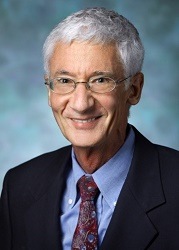Roland R. Griffiths is a professor of psychiatry and behavioral science at the Johns Hopkins University School of Medicine. He is also a consultant to the National Institutes of Health, the US Food and Drug Administration, the World Health Organization, the US Drug Enforcement Administration, and many pharmaceutical companies. His primary areas of study are sedative-hypnotics1,2 and using hallucinogens as medicine,3 particularly the therapeutic uses of psilocybin4. He also researches and writes about caffeine dependence.5–8
Dr. Griffiths received his Bachelor of Science in psychology from Occidental College in Los Angeles, California in 1968 and his doctorate in psychology and pharmacology from the University of Minnesota in Minneapolis in 1972. Over the years he has authored over 360 journal articles and book chapters.
Mystical Experiences From Psilocybin
Dr. Griffiths has taught and researched in neuroscience, psychiatry, and behavioral sciences at Johns Hopkins University since 1972. In 1999, he started the Johns Hopkins Psilocybin Research Project. One of the main areas he focuses on is if and how psilocybin brings about mystical experiences.9–12 The work has found that psilocybin does produce mystical experiences9 which study participants say are “among the most personally meaningful and spiritually significant of their lives.” 10 Psilocybin also significantly increases people’s ‘openness’ at higher doses.11 The increased openness is consistent with the study participant’s reports of increased imagination, aesthetic appreciation, and creativity. Dr. Griffiths has also found that that mystical effects of psilocybin include positive effects on mood, attitudes, and behavior.12 These effects persisted 14 months after the study ended.
Psilocybin Aids in Smoking Cessation
Smoking cessation treatment with psilocybin is another area Dr. Griffiths is exploring.13–16 A pilot study done in 2014 found 80% of the participants were still abstinent from smoking after 6 months, far exceeding the <35% cessation rate of other behavioral and/or pharmaceutical therapies.13 A long-term follow-up study of the same participants done in 2015 revealed that not only were they not smoking, but they reported “profound, insightful psilocybin experiences.” 15 Mystical experiences occurred for 60% of people in the study. Those who had them were more likely to stop and remain abstinent from smoking.14
Further analysis of how psilocybin helps with smoking cessation was published by Dr. Griffiths and his team in June 2018.16 Retrospective follow-up interviews were done with 12 of the 15 study participants 30 months after their initial psilocybin-assisted therapy sessions. The participants reported gaining “…vivid insights into self-identity and reasons for smoking from their psilocybin sessions. Experiences of interconnectedness, awe, and curiosity persisted beyond the duration of acute drug effects. Participants emphasized that the content of psilocybin experiences overshadowed any short-term withdrawal symptoms.” Overall, the participants also experienced positive changes besides smoking cessation including increased altruism, aesthetic appreciation, and pro-social behavior.
Anxiety Relief for Cancer Patients
Dr. Griffiths has also discovered that psilocybin helps decrease depression and anxiety in cancer patients.17 He tested very low (placebo-like) and very high (22 or 30 mg/70 kg) doses in 51 cancer patients with life-threatening conditions and experiencing depression and/or anxiety. Participants in the high dose group had better moods, decreased death anxiety, and increases in quality of life, optimism, and meaning of life. After six months, about 80% of the original high dose group still had improved moods and decreased anxiety. Interestingly, the study participants also reported mystical experiences on their session days.
Dr. Griffiths has given several TEDMed and TEDx talks, including one on using psilocybin to relieve suffering.
More information about Roland Griffiths is found on his Johns Hopkins Medicine webpage and his LinkedIn profile.

